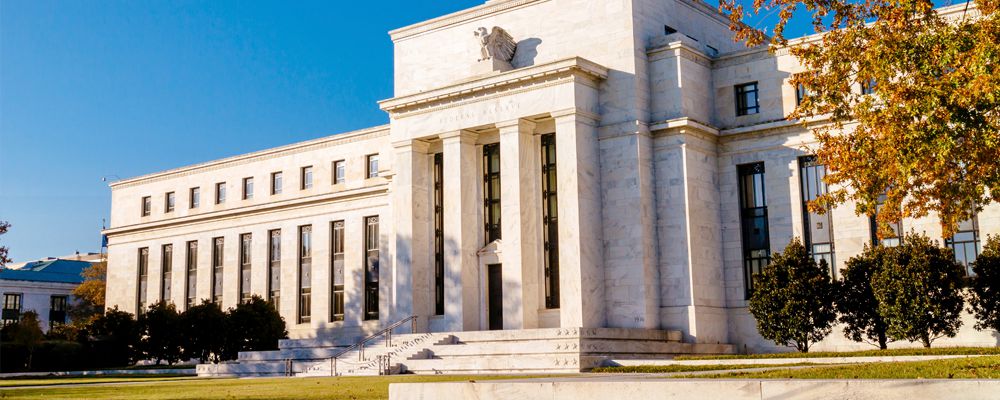The Fed is now much more supportive
- Thursday, December 5, 2019
 It is easy for investors to be concerned about the state of the world at the moment. Climate change is impacting our lives with increasing frequency. We have witnessed severe flooding in South Yorkshire and the intense forest fires in Queensland and New South Wales. We have also experienced civil unrest in Hong Kong, further fighting in Syria, economic crisis in Argentina, and our own Parliament in gridlock.
It is easy for investors to be concerned about the state of the world at the moment. Climate change is impacting our lives with increasing frequency. We have witnessed severe flooding in South Yorkshire and the intense forest fires in Queensland and New South Wales. We have also experienced civil unrest in Hong Kong, further fighting in Syria, economic crisis in Argentina, and our own Parliament in gridlock.
While all this unrest and disaster has been going on, the major central banks have been making life a little easier for business to combat the ongoing US-China trade tensions and reboot sluggish growth rates.
Despite this uncertainty, leading stock markets have been hitting new highs. The factors driving the rise in values are the cut in US interest rates, the restart of Quantitative Easing (QE) in America and Europe, an easing of the US-China trade dispute, and the likelihood that the Fed has put off a recession. If the outlook is one of a slowing economy with pressure on profits, then the release has been the Fed and the ECB turning on the money taps again.
The S&P 500 index started 2019 valued at 2506 and by mid-November was valued at 3090, a gain of 23%. The Euro Stoxx 50 index likewise gained 24%; the Nikkei 225 index was up 20%; and even the unloved FTSE 100, faced with unprecedented uncertainty, rose by 9.4%.
Markets have enjoyed a very good 2019 after a volatile end to 2018. This tailwind is a combination of factors mainly emulating from the USA. The yields on US government debt has returned to a more normal pattern since mid-October as investors returned to a ‘risk on’ mode. Markets have spent much of 2019 worrying that the US-China trade war would trigger a recession. While growth has slowed, it is at lease positive. Investors are feeling more optimistic as a recession looks to have been averted.
The US-China trade negotiations seem to be making progress. The two countries have a shared interest in defusing the two-year long dispute. A Phase 1 agreement looks to be likely but may not now be signed in December due to China’s reaction to the Hong Kong protests. China has warned the US it could take “firm counter-measures” if Washington continues to show support for pro-democracy protesters in Hong Kong. The warning came after President Trump signed the Human Rights and Democracy Act into law. The act mandates an annual review, to check if Hong Kong has enough autonomy to justify special status with the US. Among other things, Hong Kong’s special status means it is not affected by US sanctions or tariffs placed on the mainland. Analysts feel the move could complicate the negotiations between China and America.
The Federal Reserve has now cut US interest rates by a total of 0.75% this year. These rate cuts have not yet fully fed into the economy. In the coming months, US citizens will start to enjoy cheaper mortgages and businesses will have lower borrowing costs.
Despite a major strike by General Motors staff, the US economy added 128,000 new jobs in October, 136,000 in September and 130,000 in August. The US unemployment rate stands at 3.6%. This consistent increase in new jobs is a strong aspect to the American economy.
US companies delivered lower profits in the latest quarterly results season. These results were however better than expected. While earnings and growth are weak, they are expected to pick up as we head into 2020.
Safe haven assets such as gilts and gold have seen some changes in recent weeks. Bond yields have improved while the price of gold fallen. This is a reflection that markets are more optimistic. Central banks are in full loosening mode and there is more cash in the global economy through renewed QE. With weaker growth rates expected, we anticipate that investment returns will be modest but acceptable for the late stage in this long running economic expansion.
The end of 2019 is certainly more positive in outlook than at the very beginning of the year. In January, we were concerned that the Federal Reserve could make a grave policy error by putting up US interest rates at the wrong time for the economy. This could have sparked a major fall in equity market. This concern was the reason we were very cautious in Q1 2019 and held more in cash than we would normally. The Fed is now much more supportive.

Chris Davies
Chartered Financial AdviserChris is a Chartered Independent Financial Adviser and leads the investment team.
About Estate Capital
Financial Services
Our Contacts
7 Uplands Crescent,
Swansea, South Wales,
SA2 0PA.
Tel: 01792 477763
